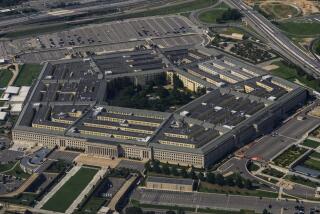Law’s Reach Extends to Jails in U.S.
WASHINGTON — The military tribunals bill signed by President Bush on Tuesday marks the first time the right of habeas corpus has been curtailed by law for millions of people in the United States.
Although debate focused on trials at Guantanamo Bay, the new law also takes away from noncitizens in the U.S. -- including more than 12 million permanent residents -- the right to go to court if they are declared “unlawful enemy combatants.”
No one has suggested that the Bush administration plans to use its newly won power to round up large numbers of immigrants.
But before Tuesday, the principle of habeas corpus meant that anyone thrown into jail in the U.S. had a right to ask a judge for a hearing. They also had a right to go free if the government could not show a legal basis for holding them. The Latin term for “you have the body,” habeas corpus is considered one of an accused person’s most basic rights.
Many legal scholars predict the law’s partial repeal of habeas corpus will be struck down as unconstitutional.
“This is an outright slap at the Supreme Court, and it is heading for invalidation,” said Eric M. Freedman, a law professor at Hofstra University and an expert on habeas corpus. “This is a core principle of law that was established by the prisoners who were tossed into the Tower of London by the king, and it was preserved in the Constitution. Now, Congress is saying it doesn’t apply to this disfavored group of prisoners.”
The new law says: “No court, justice or judge shall have jurisdiction to hear or consider an application for a writ of habeas corpus filed by or on behalf of an alien detained by the United States who has been determined ... to have been properly detained as an enemy combatant or is awaiting such determination.”
In early drafts, the bill would have cut off habeas corpus only for unlawful combatants detained “outside the United States” and at Guantanamo Bay. However, the final version deleted that phrase.
Now, it not only bars the men held at Guantanamo Bay from challenging their detention in court, it also closes the courthouse door to noncitizens who are arrested in Los Angeles or Chicago and held by the military as a possible “unlawful enemy combatant.” The new law also defines this term broadly to include not just terrorists and fighters, but also people who have “materially supported hostilities against the United States.”
Although an American citizen can be arrested as an “enemy combatant,” he or she can challenge the government’s action in court.
Some legal experts say the fate of this limited repeal of habeas corpus is uncertain because it is unprecedented.
“This is one of the great unresolved questions because this has never happened before,” said Duke University law professor Erwin Chemerinsky, a critic of the Bush administration. “The question is whether this is an unconstitutional suspension of the writ of habeas corpus.”
The Constitution makes clear habeas corpus can be suspended, but only during extreme emergencies. It says, “The privilege of the writ of habeas corpus shall not be suspended, unless when in cases of rebellion or invasion the public safety may require it.”
In the most famous example, President Lincoln suspended habeas corpus during the Civil War.
Habeas corpus does not always work in favor of the detained. During World War II, the Supreme Court heard the case of the more than 100,000 Japanese Americans who were interned but ruled they were being held legally because of a wartime emergency.
Bush administration lawyers have said this, too, is wartime and the attacks of Sept. 11 were akin to an invasion. Moreover, Congress has now endorsed the president’s power to hold “enemy combatants.”
But others say the court will not find support in the Constitution for the new law. The law does not qualify under any of the tests for suspending habeas corpus spelled out there, said John D. Hutson, a former judge advocate general of the Navy and dean of the Franklin Pierce Law School in New Hampshire.
“This is not a time of rebellion. There has not been an invasion, and there’s no evidence the ‘public safety’ requires it,” Hutson said. “Let’s not kid ourselves. This is not about an invasion. It is about the embarrassment of holding people who, if they got to court, could show they should not have been held.”
Still, the outcome of any case that reached the Supreme Court would be hard to predict because the justices have been closely split when faced with a clash between civil liberties and wartime powers.
In June, the court divided 5-3 on whether Bush had the power, acting on his own, to set up a system of military trials at Guantanamo Bay. The justices had taken up a writ of habeas corpus filed on behalf of Salim Ahmed Hamdan, a onetime driver for Osama bin Laden who was charged with conspiring to kill Americans.
The five-justice majority struck down Bush’s rules and said they must be written into law. Three others dissented. Chief Justice John G. Roberts Jr. recused himself, but had backed the plan when he was an appeals court judge.
Now, Congress has written the president’s rules into law and seeks to prevent the courts, including the Supreme Court, from hearing a challenge to them.
Pepperdine University law professor Douglas W. Kmiec said Congress and the White House were on solid ground in seeking to cut off legal appeals from foreign fighters held by the U.S. military abroad, including at Guantanamo Bay.
“I would say habeas has no application to wartime detention outside the United States,” said Kmiec, who has generally defended the Bush administration.
After World War II, the Supreme Court ruled German military prisoners held by U.S. authorities had no right to challenge their detentions through a writ of habeas corpus, he noted.
But detentions within this country have been seen differently, he added. “This is one of the most difficult questions posed by this act. There is no question that a habeas right has existed within the territorial United States for citizens and legal residents,” Kmiec said.
A test case could head to the Supreme Court in a few months. Armed with the new law, government lawyers Tuesday told judges in Washington they should throw out pending cases filed on behalf of the men held at Guantanamo Bay. Their lawyers are sure to appeal to the high court.
The government could also move to cut off further court hearings for Ali Saleh Kahlah Al-Marri, the only person now being held in this country as an enemy combatant.
A native of Qatar who was a graduate student at Bradley University in Peoria, Ill., Al-Marri was arrested in December 2001 and declared an enemy combatant by the president in 2003. Government officials alleged that he was a secret Al Qaeda operative.
“He has not been charged with anything. It’s atrocious and un-American,” said Lawrence Lustberg, Al-Marri’s lawyer. “We believe this case is headed for the Supreme Court.”
*
More to Read
Sign up for Essential California
The most important California stories and recommendations in your inbox every morning.
You may occasionally receive promotional content from the Los Angeles Times.











